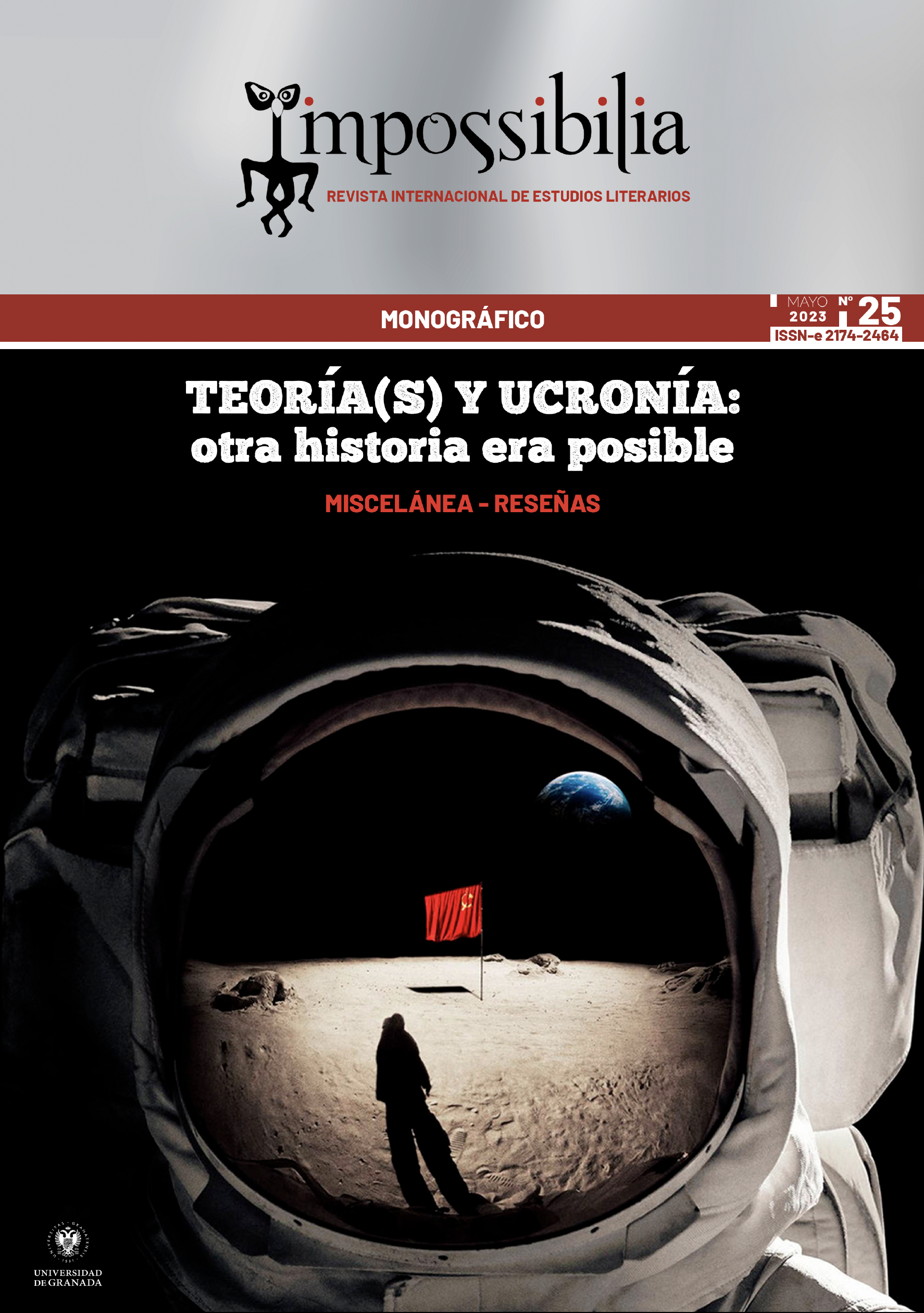“Peace for our Time”: a Uchronian Approach to British Fascism in Jo Walton’s "Farthing"
DOI:
https://doi.org/10.30827/impossibilia.252023.27127Keywords:
Uchronia, counterfactuals, fascism, antisemitism, peace, Ucronía, contrafácticos, fascismo, antisemitismo, pazAbstract
This paper draws on a uchronian framework to analyse Jo Walton’s Farthing (2006) as a suitable example of a counterfactual Britain in the aftermath of an effective peace agreement with Nazi Germany. The following pages will attempt to intertwine the purely historical comment on the intricacies that underlay the rise of fascism in the country with the allohistorical turns that ignite the plot of the novel and its point of divergence, which brings about the appointment of a fascist militant as Prime Minister and the outburst of a violent antisemitic wave. The study of this novel will be informed by a wide array of critics and historians like Amy Ramson, Karen Hellekson, Richard Thurlow or Nigel Copsey, among others, whose work contributes to tracing significant parallelisms between the historical outcome and the uchronian alternatives Walton explores in her work
Downloads
References
BALDOLI, Claudia. (2004). Anglo-Italian Fascist Solidarity?: The Shift from Italophilia to Naziphilia in the BUF. In Gottlieb, Julie and Linehan, Thomas (Eds.), The Culture of Fascism: Visions of the Far-Right in Britain (pp. 147-161). London & New York: Tauris.
BLAND, Benjamin. (2019). Holocaust inversion, anti-Zionism and British Neo-fascism: the Israel–Palestine Conflict and the Extreme Right in Post-war Britain. Patterns of Prejudice, (53)1, 86-97.
CARR, E.H. (1961). What is History? London: Penguin.
COPSEY, Nigel. (2008). Contemporary British Fascism: The British National Party and the Quest for Legitimacy. Hampshire and New York: Palgrave Macmillan.
COWLEY, Robert. (Ed). (2001). More What If? Military Historians Imagine What Might Have Been. London: Pan Books.
FERGUSSON, Niall. (Ed). (2003). Virtual History: Alternatives and Counterfactuals. London: Pan Books.
HALL III, Hines H. (1976). The Foreign Policy-Making Process in Britain, 1934-1935, and the Origins of the Anglo-German Naval Agreement. The Historical Journal, (19)2, 477-499.
HANDWERK, Brian. (2016). Will We ever Know why Nazi Leader Rudolf Hess Flew to Scotland in the Middle of World War II? https://bit.ly/3vtQ0V3.
HARDESTY, William H. (2003). Toward a Theory of Alternate History: Some Versions of Alternate Nazis. In Chapman, Edward L. (Ed.), Classic and iconoclastic alternate history science fiction (pp. 71-92). Lewiston, NY; Lampeter: Mellen P.
HELLEKSON, Karen. (2000). Toward a Taxonomy of the Alternate History Genre. Extrapolation, (41)3, 248-256.
HILLIARD, Christopher. (2016). Words that Disturb the State: Hate Speech and the Lessons of Fascism in Britain, 1930s–1960s. The Journal of Modern History, (88)4, 764-796.
HOERBER, Thomas. (2009). Psychology and Reasoning in the Anglo-German Naval Agreement, 1935-1939. The Historical Journal, (52)1, 153-174.
KLEIN, Christopher. (2020). Chamberlain declares “Peace of our Time”. https://bit.ly/3VM22nu.
LeCRAS, Luke. (2018). ‘Europe a Nation’ or ‘Common Market Suicide’? Fascism, European Entanglement and the Ideology of Britain’s Extreme Right, 1945-75. Australian Journal of Politics and History, (64)3, 436-449.
MESSENGER, Charles. (2002). The Battle of Britain, 1940: the Triumph of the Luftwaffe. In Tsouras, Peter G. (Ed.), Third World Victorious: Alternate Decisions of World War II (65-96). London: Greenhill Books.
RANSOM, Amy J. (2003). Alternate History and Uchronia: Some Questions of Terminology and Genre. Foundation. The International Review of Science Fiction, (32)87, 58-72.
ROSENFELD, Gavriel. (2002). Why do we Ask “What If?”: Reflections on the Function of Alternate History. History and Theory, 41, 90-103.
SCHMUNK, Robert. (2022). Uchronia. http://www.uchronia.net/intro.html.
THOMPSON, E.P. (1978). The Poverty of Theory and other Essays. London: Merlin.
THURLOW, Richard. (1998). Fascism in Britain: from Oswald’s Mosley’s Blackshirts to the National Front. London and New York: Tauris.
THURLOW, Richard. (2004). The Developing British Fascist Interpretation of Race, Culture and Evolution. In Gottlieb, Julie and Linehan, Thomas (Eds.), The Culture of Fascism: Visions of the Far-Right in Britain. (66-82). London & New York: Tauris.
WALTON, Jo. (2006). Farthing [e-book]
Downloads
Published
How to Cite
Issue
Section
License
Copyright (c) 2023 Impossibilia. Revista Internacional de Estudios Literarios

This work is licensed under a Creative Commons Attribution-NonCommercial-NoDerivatives 4.0 International License.

You are free to share, copy and redistribute the material in any medium or format under the following terms: You must give appropriate credit, you may not use the material for commercial purposes and No Derivatives. Commits to respecting third party intellectual property rights.
Reception and proccesing of papers has no costs for authors.
Author assumes responsibility for the ideas contained in the article.
Papers must be original and must not have been published before and at the moment they are submitted, papers should not be in the process of evaluation by any other electronic or printed media.
The authors are allowed and recommended to publish their published work through the internet. It could produced interesting exchanges and increase the published work citation. (See El efecto del acceso abierto).




















